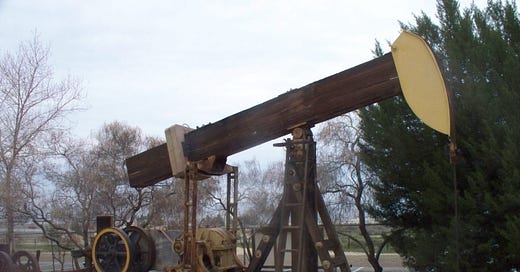Canadians Have Fossil Industry on the Defensive
Polling shows 64% public support for a regulated cap on oil and gas emissions, despite the Pathways Alliance’s feverish lobbying. And Pathways stands accused of false advertising. Nervous much?
A new poll this week by Abacus Data helps explain why Canada’s fossil lobby has been sounding a bit tetchy and defensive lately.
Nearly two-thirds of respondents—including 51% of Conservative voters and 52% in oil-rich Alberta—support the oil and gas emissions cap that Environment and Climate Minister Steven Guilbeault has promised to release later this year, Abacus found [pdf]. The online poll had a 2.21% margin for error, 19 times out of 20.
Abacus reported that:
64% of Canadians believe the oil and gas industry should be required to limit its greenhouse gas emissions so that Canada can meet its climate targets.
61% think the industry will only take that action if it’s required to do so by regulation. Just one in five have bought the line that fossils will reduce their emissions voluntarily.
Digging a bit deeper into the numbers, 71% of respondents aged 60 and over supported a mandatory cap, as did 72% of Liberal voters, 81% of New Democrats, and strangely, only 64% of Green Party supporters. Conservatives supported the measure by a 20-point margin, 51 to 31%, and Albertans supported it 52 to 26%—a two-to-one margin among respondents with a firm opinion on the matter.
And the industry should be truly alarmed at the tiny percentages who believed the country’s massively profitable oil and gas producers can be trusted to reduce their own emissions without a solid push from politicians and regulators: we’re talking numbers like 14% of Liberals, 15% of New Democrats, 35% of Conservatives, 15% of seniors, 26% of young adults, 17% in Atlantic Canada, 21% in Saskatchewan and Manitoba, and 34% of Albertans.
In other words, among the Canadians who know the fossil industry best, only one-third are willing to take the industry at its word. Maybe things would be different if deadbeat fossils had been willing to pay their taxes to small, rural municipalities that have been scrambling to fund the basic services their citizens need. Or do their part to cover the $260-billion mess they’ve left behind in the form of abandoned oil wells across the province.
Political Winds Are Shifting
Climate Action Network-Canada (CAN-Rac) released the poll results just a day before Abacus published its own data showing the NDP opposition with an eight-point lead over Danielle Smith’s largely fossil-financed United Conservative Party (UCP) ahead of provincial elections May 29.
Abacus Chair and CEO David Coletto was pretty clear that this is emerging more as a vote against an extremist incumbent than the birth of a new political alignment. But that should be cold comfort for the oil and gas lobby. This would be the same UCP that appointed a former pipeline executive as energy minister, then environment minister, and worked hard to gin up political support by casting Ottawa as Alberta’s mortal enemy and fossil fuels as the province’s only ticket to economic salvation. Now, the winds appear to be shifting, and clearly not in the industry’s favour.
And speaking of shifting winds, Abacus conducted the emissions cap poll March 17-21, before an early spring heat wave brought a rash of wildfires to Alberta’s northern and east-central regions. At mid-week, 24 of the province’s 89 fires were burning out of control, nearly 30,000 people had been evacuated, small Indigenous communities were reporting significant losses, and some fossil fuel operations had been suspended.
Smith declared a state of emergency and asked for help from a federal government that she would otherwise have been only too happy to trash—a request that was still reasonable in a federation like Canada’s, even after the province cut funding for a 63-member Rapattack team that could have quickly quelled many of the fires before they had a chance to grow and spread.
By last week, Elections Alberta was considering whether to postpone the vote in at least one constituency hit hard by the fires. With another heat wave and dry spell on the way to complicate firefighting efforts, it’s hard to imagine how the province’s latest round of extreme conditions will help the UCP at the ballot box.
Clearing the Air on Fossil PR
Meanwhile, the lobby group whose six members account for 95% of Alberta’s oil sands production will be working to stamp out a brushfire of its own, after the federal Competition Bureau announced it was investigating the Pathways Alliance for false advertising. Three environmental groups had charged that Pathways misled the public with its Let’s Clear the Air ad campaign, Reuters reported yesterday, and the bureau has now moved into a full review of the available facts.
The complaint feels a little bit like putting a murderous mob boss like Al Capone away for tax evasion. Then again, the 64% in the Abacus poll who support a mandatory oil and gas cap might welcome an independent assessment of the industry’s messaging.
“We think the public deserves to be told the truth about the environmental harm caused by fossil fuel production,” said Greenpeace Canada senior researcher Nola Poirier.
“Our campaign acknowledges the oil sands represent a significant share of our country’s emissions and that we must work collaboratively, including with governments, to achieve our goal of net zero from operations,” replied Pathways VP Mark Cameron.
But that collaboration thing hasn’t been going so well for the industry, and the fossil lobby has been sounding distinctly impatient with the reception it’s getting in Ottawa.
“Look, we have set some very aggressive climate targets in Canada. You can’t kick the can down the road,” complained carbon capture and storage (CCS) publicist James Millar, reacting to a federal budget in late March that included no additional details on how Ottawa plans to backstop the industry’s proposed carbon capture hub by essentially guaranteeing the future price of carbon.
But it isn’t just about carbon pricing. Pathways Alliance members have also made it clear they won’t dip into their own rich coffers to fund their preferred approach to emission cuts—a massive, $24.1-billion expenditure on the carbon capture hub and other assorted projects—without billions more in taxpayer subsidies. Guilbeault, who’d previously said there would be no more federal largesse for CCS, quite rightly shot back that it’s up to the industry to invest some of its record profits in cleaning up its own operations.
CCS Stumbles as Fossil Emissions Rise
Bear in mind that this is the industry that accounts for 28% of Canada’s carbon pollution and has seen its emissions increase 85% [pdf] since 1990—oil sands emissions have grown seven-fold—even as electricity sector emissions fell 45%. All the while, the industry has lobbied relentlessly and run slick PR campaigns like Let’s Clear the Air to postpone or avert the kind of public opinion backlash we’re now seeing in the latest Abacus numbers.
The push for CCS subsidies is just the latest round, and the logic is ever more tenuous. With the International Energy Agency calling for no new oil, gas, or coal fields in a 1.5°C climate future, the Canadian industry still insists it will be increasing production for the foreseeable future. Their record since 1990 shows that more production translates into more emissions—unless CCS rides in to save the day.
But if they don’t want to put their own money behind that plan, maybe it’s because they know it’s a fantasy, even if they can’t very well say it out loud. Last fall, the Institute for Energy Economics and Financial Analysis (IEEFA) took a closer look at 13 “flagship, large-scale” projects that accounted for about 55% of the world’s carbon capture capacity. The projects captured a grand total of 39 million tonnes of CO2 per year, about one one-thousandth of the 36.3 billion tonnes that emitters spewed into the atmosphere in 2021.
IEEFA found that seven of the 13 projects underperformed, two failed outright, and one was mothballed. “CCS technology has been going for 50 years and many projects have failed and continued to fail, with only a handful working,” said report co-author Bruce Robertson.
Then in February, the Winnipeg-based International Institute for Sustainable Development cautioned that CCS technology will cost too much and take too long to build to have any hope of helping industry meet Canada’s 2030 emissions reductions target. IISD argued against further federal subsidies for CCS, warning that the industry risks saddling itself with expensive stranded assets if it doesn’t change course.
All of which brings us back full circle to Guilbeault’s oil and gas emissions cap as this year’s best opportunity to start aligning the industry with the government’s 2030 climate plan. Pathways Alliance members have proven time and again that they won’t get serious about emission reductions by any other means. The polling shows that broad swaths of the Canadian public have got that memo. And the front-line crisis in Alberta, even in some of the fossil companies’ own operations, is getting more desperate by the day.
When Guilbeault first announced the emissions cap, then-Cenovus Energy CEO Alex Pourbaix countered with a call for an “achievable” path to reducing the industry’s carbon footprint. So let’s take his words, if not his preferred pathway, to heart. We know what to do about oil sands emissions. It’s time to get on with it.
Mitchell Beer traces his background in renewable energy and energy efficiency back to 1977, in climate change to 1997. Now he scans 1,200 news headlines a week to pull together The Energy Mix and The Energy Mix Weekender.
You can also bookmark our website for the latest news throughout the week.
Video of the Week








